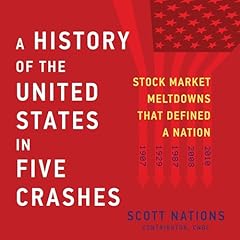
The End of Wall Street
No se pudo agregar al carrito
Add to Cart failed.
Error al Agregar a Lista de Deseos.
Error al eliminar de la lista de deseos.
Error al añadir a tu biblioteca
Error al seguir el podcast
Error al dejar de seguir el podcast
 Exclusivo para miembros Prime: ¿Nuevo en Audible? Obtén 2 audiolibros gratis con tu prueba.
Exclusivo para miembros Prime: ¿Nuevo en Audible? Obtén 2 audiolibros gratis con tu prueba.Compra ahora por $20.25
-
Narrado por:
-
Erik Synnestvedt
-
De:
-
Roger Lowenstein
Los oyentes también disfrutaron:




















Reseñas de la Crítica
“[The End of Wall Street] is a complex but imaginative book… [Lowenstein] is able to identify the creative instruments of financial destruction with the directness that is all-important to a book like this.”—New York Times
“Think of Roger Lowenstein's The End of Wall Street as a tuition-free class in 21st-century U.S. macroeconomics... The End of Wall Street debunks the notion that no one could have seen the economic catastrophe coming.”—USA Today
“The End of Wall Street is a calm, reasoned, and often witty tour of the current financial landscape and how it got that way.”—Philadelphia Observer
“In the flood of new books about the financial crisis, Roger Lowenstein's is a standout. Lowenstein, a highly accomplished financial journalist, lays out what may be the best explanation yet of the recent crash—and as good a prediction as any on what happens next.”—Barron’s
"Lowenstein’s strong knowledge of the source material and flair for the dramatic and doomsday title should draw readers who still wonder what went wrong and how."—Publishers Weekly
“Lowenstein does a great job of explaining…in understandable terms that unobtrusively avoids the injection of emotion and politics.”—Booklist
“Over the past year, there has been a steady stream of books trying to make sense of the crisis. The latest, and perhaps the most accessible and even-handed, is Roger Lowenstein's The End of Wall Street."—Washington Post
"The End of Wall Street is a good book: witty, well-written, heavily researched and often dramatic.”—Associated Press/Huffington Post
“A veteran financial/business journalist examines the past three years of economic collapse, chronicling actions and inactions from dozens of villains and a few heroes…A well-delineated chronicle likely to cause readers to ask who put the clowns in charge of the circus, and why aren’t they confined to prison cells.” —Kirkus
Las personas que vieron esto también vieron:


















What the book does mainly is to paint a more nuanced and complete picture of the crisis, tracing it back to its early origin. The media has tried to pin the blame on specific persons (such as Greenspan or the greedy bank CEOs) or institutions (such as Goldman), but the truth is much more murky. We get a better glimpse on the CEOs, who acted on both peer pressure and their own ignorance about the actual complexity of the products. The political landscape is also an important factor, which has to do with Democrats that pushed homeownership and its unintended consequences.
For me, the book answers (though not definitely), some lingering questions, such as why the Fed decided not to bail out Lehman, and whether Henry Paulson was only the banks' interest.
Compared to Michael Lewis's "The Big Short," which cuts a narrow swath by focusing on several fringe players who profited from their prescience, "The End of Wall Street" is more like the definitive recounting that covers all the bases. I would strongly recommend reading both books to get the full picture.
As for the narration, I personally find it amateurish and annoying. He sounds like a college kid doing a bad impression of an old-time PSA (he hits the last word of each sentence hard and quick). I find the voice not only lacks gravitas but worse yet, sounds as if he's just "reading" without real comprehension. Check out the sample before making your decision.
Great investigative work, terrible narration
Se ha producido un error. Vuelve a intentarlo dentro de unos minutos.
Outstanding study of the 2008-2009 economic collapse
Se ha producido un error. Vuelve a intentarlo dentro de unos minutos.
surprisingly good
Se ha producido un error. Vuelve a intentarlo dentro de unos minutos.
Great Book
Se ha producido un error. Vuelve a intentarlo dentro de unos minutos.
Would you try another book from Roger Lowenstein and/or Erik Synnestvedt?
Yes. "When Genius Failed" is an incredible book, actually.Would you recommend The End of Wall Street to your friends? Why or why not?
I would not, because most of my friends already know most of these events. But if you weren't glued to the news during the 2008 crisis, this book will give you a good overview of what happened.Which scene was your favorite?
There were no really stand-out memorable scenes.Did The End of Wall Street inspire you to do anything?
No.Any additional comments?
If you're looking for a deep explanation of why the crisis happened, don't look here; it's a narrative overview, like reading through news clippings from the time period.A whirlwind blow-by-blow of the financial crisis
Se ha producido un error. Vuelve a intentarlo dentro de unos minutos.


